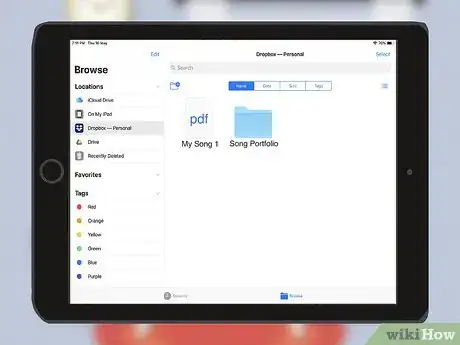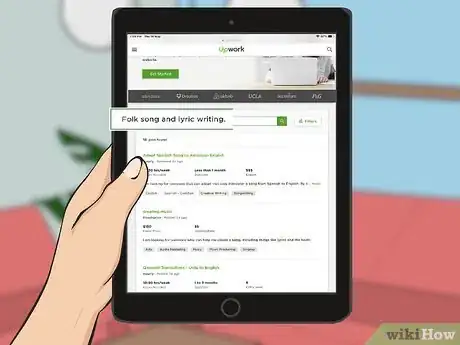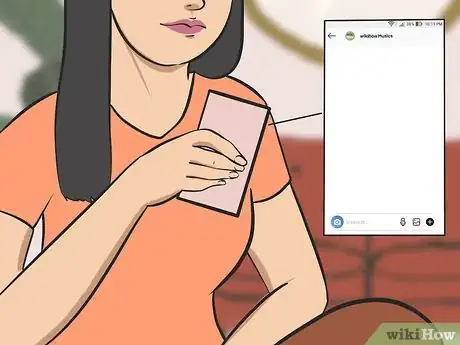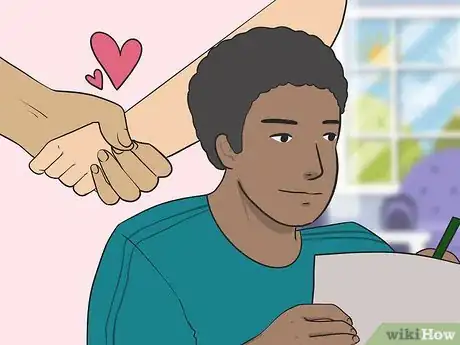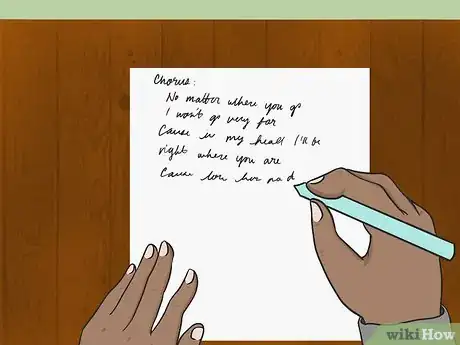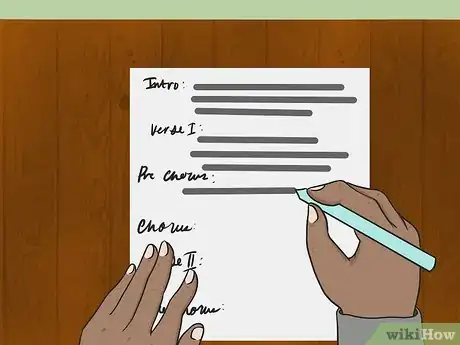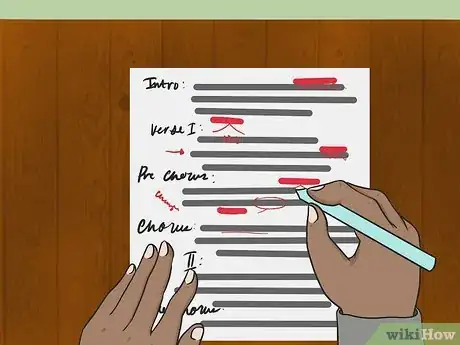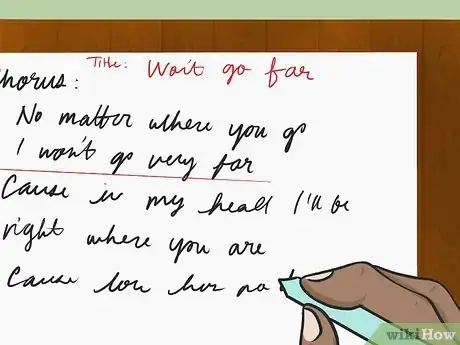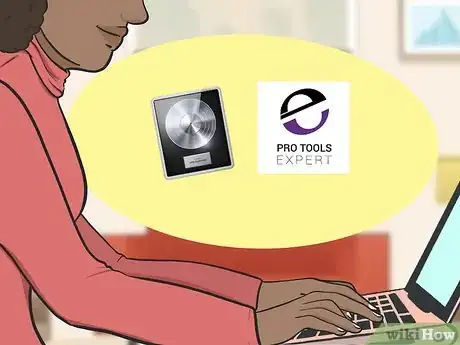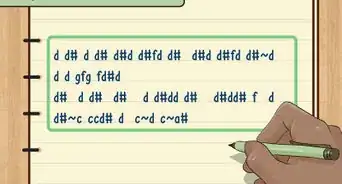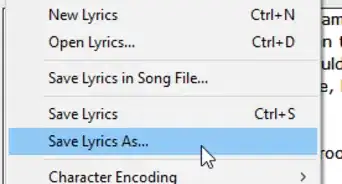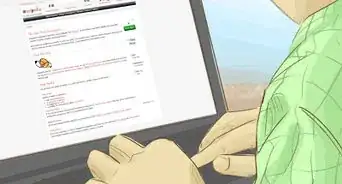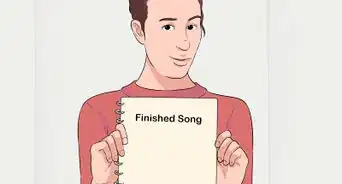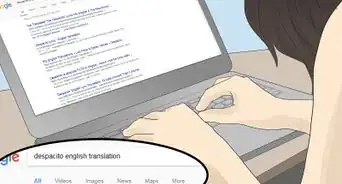This article was co-authored by wikiHow staff writer, Eric McClure. Eric McClure is an editing fellow at wikiHow where he has been editing, researching, and creating content since 2019. A former educator and poet, his work has appeared in Carcinogenic Poetry, Shot Glass Journal, Prairie Margins, and The Rusty Nail. His digital chapbook, The Internet, was also published in TL;DR Magazine. He was the winner of the Paul Carroll award for outstanding achievement in creative writing in 2014, and he was a featured reader at the Poetry Foundation’s Open Door Reading Series in 2015. Eric holds a BA in English from the University of Illinois at Chicago, and an MEd in secondary education from DePaul University.
There are 14 references cited in this article, which can be found at the bottom of the page.
wikiHow marks an article as reader-approved once it receives enough positive feedback. In this case, 99% of readers who voted found the article helpful, earning it our reader-approved status.
This article has been viewed 148,414 times.
Learn more...
A songwriter can be either a lyricist, a composer or both. While a composer creates the melody, it is the lyricist who writes the words that others perform to that melody. Becoming a lyricist requires dedication and practice to master the skills necessary to write effective and memorable song lyrics. If you’re going to become a lyricist, you’ll need to learn the craft, write some songs, and find work in your field. You’ll also want to collaborate with others and seek feedback to improve your work as you develop as a writer.
Steps
Finding Jobs as a Professional Lyricist
-
1Create a portfolio of your work to show potential employers. You’ll need to show what you’re capable of doing before you’re hired to write anything. This means that you’ll need a portfolio of your work. A portfolio should showcase your best pieces of work, and will usually be between 3-5 songs. If the songs have already been recorded, you should still include a copy of the written lyrics.[1]
- You’ll want to make sure that you can easily share your portfolio online by putting all of your song lyrics into a single PDF or Word document.
- You can use anything that you’ve written in your portfolio. It doesn’t need to contain songs that you’ve already created for clients. Just be honest about your work experience when discussing your songs.
- Consider making a personal website to showcase your work to potential employers.
-
2Look for openings online to see what opportunities exist. Search around job sites and message boards to try and find any potential openings for a lyricist. Since most songwriting jobs can be completed at home, you won’t need to worry about applying for specific jobs in your area.
- The most commonly-used job sites for freelance writers are FlexJobs, SolidGigs, Upwork, and Fiverr.[2]
- Most freelance websites require you to create an online profile and upload a portfolio. Always upload a friendly picture of yourself to make you seem more personable!
Advertisement -
3Assess freelance writing opportunities to see if they’re a good fit. When looking at prospective jobs, consider whether you have the necessary time and level of expertise that the job is calling for. Pay close attention to each job posting’s goal or required outcome, since that will tell you what you need to create. Once you apply, prospective employers will reach out and either hire you to work remotely or request additional information.
- When looking for opportunities, try searching by using keywords that relate to your specialty. For example, if you focus entirely on writing folk ballads, try entering “folk” or “love songs” in your searches.
- Working from home can be quite enjoyable, but make sure that you don’t get distracted and take too long to complete your work!
- Payment is usually received through the platform that you got hired on, and most websites will either ask you to link a bank account or PayPal account to send you your earnings.[3]
-
4Network with musicians and artists to find possible openings. Building strong relationships with your peers is a good way to get a head start on jobs for lyricists. Reach out to other songwriters on social media and connect with local writers by inviting them out for coffee or lunch. Many job opportunities can be found before they’re even available to the public if a colleague tells you about it well in advance.
-
5Don’t get discouraged if you’re struggling to find work. Songwriting is a difficult field to get into if you don’t have any experience. Don’t get too down on yourself if you’re struggling to find work immediately. Every lyricist started somewhere!
- If you’re being turned down frequently, consider looking for opportunities that explicitly don’t require experience in your field.
- Consider revising your portfolio if you aren’t getting a lot of offers. It may be that you’re choosing to show work that doesn’t demonstrate your skills!
Crafting a Song
-
1Identify what you want to write about. Start by thinking about what would be interesting to you. Jot down simple one-line ideas for a song and think about which one might be fun to work with. Once you’ve identified your topic, you can start to brainstorm your lyrics.[4]
- Some songwriters start with the musical arrangement. Consider how a tune is making you feel and try to write lyrics that match it.
- Writing about things that you’re familiar with is a good way to start. The way you see the world is unique to you, and offers a variety of topics for you to dig into.[5]
- Common topics for songs, like love or the death of a loved one, are excellent starting points if you’ve never written a song before.
-
2Brainstorm some initial lyrics to create your song’s chorus. Most songwriters start with the chorus. Starting with the chorus will anchor your song in a repeated phrase, which will make coming up with ideas for the verses a lot easier.[6] Start by writing whatever comes to mind. There are no mistakes in this stage of the writing process. Once you’ve stumbled upon an idea or phrase that you think might work, edit and add to it do develop your chorus.
- Avoid unnecessary words like “but” or “because” whenever possible. They’ll make your chorus sound clunky and can often be removed.[7]
-
3Compose your verse based on the ideas of your song’s chorus. The chorus should provide you with direction for your verses. Start by using some expressive phrases or interesting details. If your song is a narrative, start with the beginning of your story and add to it. You can also choose to write a bunch of smaller lyrics and find a way to fit them together in a way that makes sense.
- Try to show something instead of telling it. Saying “I love you” is abstract, and doesn’t give the reader a lot to chew on, while a phrase like, “My hand trembles when I hold you” provides the listener with sensory details to create a picture in their head.[8]
- Don’t repeat yourself in your verses. Your chorus should provide your song with enough repetition.[9]
-
4Create an outline for your song. This step is entirely optional, but some lyricists prefer to start with an outline. To create an outline, map out the structure of your song on notebook paper. This method is a good idea if you have no control or input over the music that you’re writing lyrics for, since it’ll be your job to match the lyrics to the music.
-
5Revise and edit your lyrics to make sure they fit. After you’ve completed your draft, reread and recite your lyrics. If they make sense, work well together, and sound pleasing to you, then you’re done! But the odds are good that you’ll want to go back in and change things to make your song more fluid.[10]
- Show your lyrics to a friend or colleague if you don’t know what to change. Another set of eyes may catch something that you missed.
- Focus on bigger problems at first. It may be possible that you need to rewrite an entire verse! Start there before focusing on the little things.[11]
-
6Choose a catchy or meaningful title for your song. A good title is both informative and memorable. A strong title indicates what your song is about and should be short enough for your listener to memorize. If you’re having trouble coming up with a good title, try using the first line of the song or the most repeated phrase of the chorus.[12]
- A lot of songwriters title their songs after any repeated phrases or lyrics so that the listening audience will be able to remember the title easily.
Improving Your Skills
-
1Familiarize yourself with songwriting and word processing software. You’ll need to know the tools of your trade if you’re going to be a marketable lyricist. Consider taking a course at a local community college or audio engineering academy to learn the common songwriting programs and word processing software. You’ll need to know how to talk about these programs when discussing possible job requirements or receiving feedback.
- Audio recording software is used to engineer, record, and master music. Since you’ll be writing the lyrics that go into the songs that end up getting recorded (or recording them yourself), you’ll want to be familiar with how these programs work.[13]
- The most popular digital audio workspaces (or DAWs) are Logic Pro, Pro Tools, Ableton, and Cubase. Having at least a preliminary understanding of these audio tools could really help land you a job.[14]
-
2Solicit feedback on your work to improve your writing. Getting feedback from others is an excellent way to sharpen your skills as a lyricist. Criticism gives you crucial insight into what you need to improve upon or change in your writing. Feedback is going to be a big part of your songwriting contracts anyway, and getting in the practice of sharing your work with others is essential.[15]
- Don’t take negative criticism to heart. If there’s something that you can improve upon, you should want to know about it!
-
3Attend workshops to improve your process. Writing workshops are small communities or classes where writers share their work with one another. The goal is to hear as many critiques as possible in order to make your writing as effective as it can be. Search online or ask artists in your area about local workshops.[16]
- There are also plenty of online communities that engage in workshops. If you don’t have any established writing workshops near you, consider joining one online.
-
4Study the great lyricists in your genre to see what they do. Every genre of music has classic artists. If you want to write a great pop song, you should probably see how established and beloved artists did it first. Seek out famous writers and songs and figure out what made them great by looking at their lyrics directly. Take notes on clever uses of grammar or sentence structure, and pay attention to how great lyricists rhyme unconventional words together.[17]
-
5Collaborate with other writers to improve your songs. Many aspiring writers believe that the writing process is solitary and done in isolation. This couldn’t be further from the truth. Lyricists almost always work with others, and getting the necessary practice will be essential to improving your skills. Seek out other writers to work with, and ask how they’d improve or change your lyrics.[18]
- You don’t have to collaborate in person. There are a lot of online forums and message boards where aspiring writers look at each other’s work and collaborate.
- Be open to suggestions and don’t fight over ideas when working with others. Songwriting can be a deeply personal process, but it’s not worth ruining a relationship![19]
Community Q&A
Did you know you can get answers researched by wikiHow Staff?
Unlock staff-researched answers by supporting wikiHow
-
QuestionShould my lyrics have a copyright before I post them to a website?
 wikiHow Staff EditorThis answer was written by one of our trained team of researchers who validated it for accuracy and comprehensiveness.
wikiHow Staff EditorThis answer was written by one of our trained team of researchers who validated it for accuracy and comprehensiveness.
Staff Answer wikiHow Staff EditorStaff AnswerGood question! In the United States, your lyrics are automatically copyright as soon as you've written them, but it can be difficult to prove that they're your lyrics without some type of proof. In addition, some websites may claim that your work belongs to them if you post it on their website (some websites put something like this in their terms of service). If you want to officially register them, you can register a copyright with the United States Copyright Office for a small fee.
wikiHow Staff EditorStaff AnswerGood question! In the United States, your lyrics are automatically copyright as soon as you've written them, but it can be difficult to prove that they're your lyrics without some type of proof. In addition, some websites may claim that your work belongs to them if you post it on their website (some websites put something like this in their terms of service). If you want to officially register them, you can register a copyright with the United States Copyright Office for a small fee. -
QuestionHow can I sell my lyrics to Bollywood?
 wikiHow Staff EditorThis answer was written by one of our trained team of researchers who validated it for accuracy and comprehensiveness.
wikiHow Staff EditorThis answer was written by one of our trained team of researchers who validated it for accuracy and comprehensiveness.
Staff Answer wikiHow Staff EditorStaff Answer
wikiHow Staff EditorStaff Answer -
QuestionI make a song then what I do?
 wikiHow Staff EditorThis answer was written by one of our trained team of researchers who validated it for accuracy and comprehensiveness.
wikiHow Staff EditorThis answer was written by one of our trained team of researchers who validated it for accuracy and comprehensiveness.
Staff Answer wikiHow Staff EditorStaff AnswerIf you haven't already recorded your music, do that first. You can rent out a studio space, or record it yourself if you have a microphone, pre-amp (if necessary for your microphone), and access to audio recording software. Once you've recorded your song, you can share it with others and use it as an example of the work that you're capable of.
wikiHow Staff EditorStaff AnswerIf you haven't already recorded your music, do that first. You can rent out a studio space, or record it yourself if you have a microphone, pre-amp (if necessary for your microphone), and access to audio recording software. Once you've recorded your song, you can share it with others and use it as an example of the work that you're capable of.
References
- ↑ https://www.iwillteachyoutoberich.com/blog/freelance-portfolio/
- ↑ https://www.ryrob.com/freelance-jobs/
- ↑ https://support.upwork.com/hc/en-us/articles/211063668-Get-Paid-for-Hourly-Contracts
- ↑ https://www.dittomusic.com/blog/how-to-write-a-song-10-tips-on-how-to-boost-your-creative-side-when-writing-songs
- ↑ https://slate.com/human-interest/2014/03/how-do-writers-figure-out-what-they-want-to-write-about.html
- ↑ https://www.dittomusic.com/blog/how-to-write-a-song-10-tips-on-how-to-boost-your-creative-side-when-writing-songs
- ↑ https://www.bmi.com/news/entry/7_tips_for_instantly_better_lyrics
- ↑ https://www.bmi.com/news/entry/7_tips_for_instantly_better_lyrics
- ↑ https://www.bmi.com/news/entry/7_tips_for_instantly_better_lyrics
- ↑ https://lyricworkroom.com/stepping-back-a-simple-guide-to-rewriting-songs/
- ↑ https://lyricworkroom.com/stepping-back-a-simple-guide-to-rewriting-songs/
- ↑ http://writing.umn.edu/sws/assets/pdf/quicktips/titles.pdf
- ↑ https://youtu.be/OqMrgQ0bHYo?t=6
- ↑ https://www.musicianonamission.com/best-daw-2016/
- ↑ https://www.edmprod.com/5-tips-gathering-feedback/
- ↑ https://www.writermag.com/improve-your-writing/writing-education/writing-workshop-participant/
- ↑ https://www.secretsofsongwriting.com/2016/01/04/which-songs-are-the-best-ones-for-songwriters-to-study/
- ↑ https://www.bmi.com/news/entry/the_dos_and_donts_of_co-writing
- ↑ https://www.bmi.com/news/entry/the_dos_and_donts_of_co-writing
About This Article
Becoming a lyricist is a great way to share your creative talent with the world, and you can get started by networking with other artists and creating a portfolio. Try to collaborate with other writers and singers to get your name out there. A large part of getting work in the music industry is building relationships with musicians and producers, but don't worry if you don't already know people. With social media and websites like SoundCloud, it's never been easier to contact other artists and collaborate remotely. You can also join local songwriting workshops to get feedback on your work and meet other aspiring lyricists. Once you've got some good songs under your belt, compile all of your best work to highlight your skills as a lyricist. Then, you can look for lyricist jobs online. For more tips, including how to write engaging lyrics, read on!
